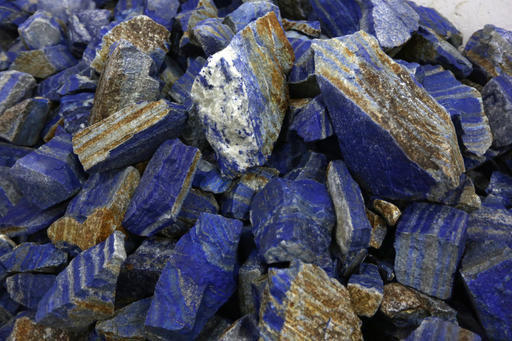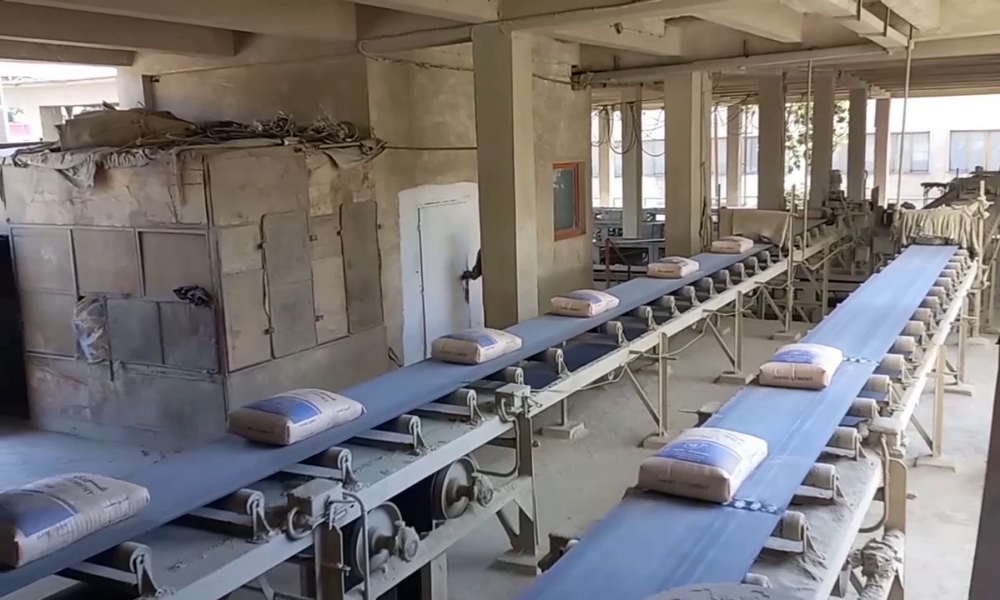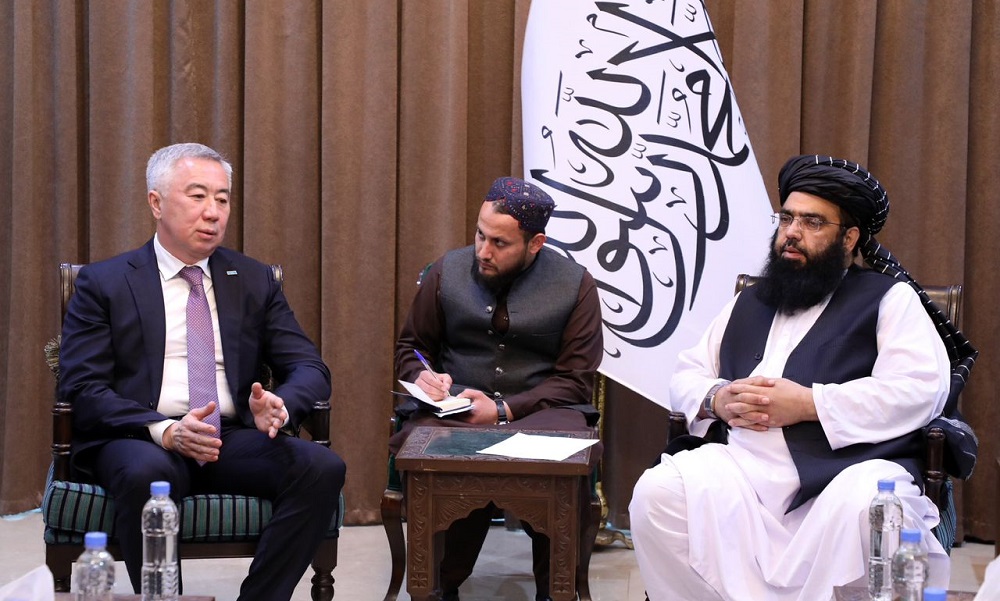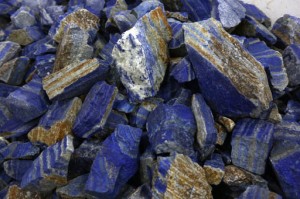Latest News
Watchdog: Afghanistan’s lapis lazuli is a ‘conflict mineral’

(AP): Afghanistan’s mineral wealth is helping fuel the war that has long ravaged the country, with armed anti-government groups — including the Taliban — earning up to $20 million a year from illegal mining of lapis lazuli, a London-based corruption watchdog said on Monday.
The group, Global Witness, appealed in its new report to have lapis lazuli, a blue stone almost unique to Afghanistan, classified as a “conflict mineral.”
The lapis lazuli mines are mostly concentrated in northern Badakhshan province where the stone has been mined for centuries for use in jewelry and ornaments, prized for its bright blue hues. The province has been “deeply destabilized” by violent competition for control of the mines between local strongmen, law makers and the Taliban, Global Witness said.
Badakhshan is also a microcosm of what is happening across the country, as mining has become the Taliban’s second biggest source of income, after drugs. The Taliban, who have been fighting to overthrow the Kabul administration for 15 years, control the production of opium poppies, mostly in the southern province of Helmand, the raw material for most of the world’s heroin. The drugs trade is worth up to $3 billion a year, experts have said.
Afghanistan’s mineral and petrochemical assets are believed to be worth billions of dollars, but the government does not have the money or expertise to develop them, and international firms are deterred by the deteriorating security situation.
Global Witness said that if properly developed, these assets could earn the government $2 billion in annual revenue. The report says the government lost at least $17.5 million in revenue from lapis lazuli alone in 2014, and $10 million in 2015.
The total earned by armed groups in 2014 was $19.9 million, the group added, noting that a local strongman identified as Abdul Malek had paid $750,000 in protection money to the Taliban out of proceeds from the illegal lapis lazuli mining. Last year, Malek paid the Taliban $4 million, the report says.
Without government regulation or control, mining assets have slipped out of Kabul’s control. Global Witness said the Badakhshan lapis lazuli mines have also become a “strategic priority” for Afghanistan’s Islamic State affiliate, which emerged over the past year mostly in the country’s east, along the border with Pakistan.
“Unless the Afghan government acts rapidly to regain control, the battle for the lapis mines is set to intensify and further destabilize the country, as well as fund extremism,” Global Witness said.
The government banned lapis lazuli mining in early 2015 as the mines could not be secured, Afghan officials have told The Associated Press. But the mining continued with impunity, with local police and politicians reportedly benefiting from the illegal extraction and export of the stone.
Much of the illegal lapis lazuli exports go to China, “where it is prized as jewelry,” Global Witness says. “The fact that Chinese lapis sales are funding the Taliban comes in contrast to the Chinese government’s official position as peace-broker on Afghanistan in regional security talks.”
Beijing is part of four-country consultations with Afghanistan, Pakistan and the United States, aimed at bringing the Taliban into a peace dialogue to end the war.
The Taliban are expected to step up violence this year as their new leader, Mullah Haibatullah Akhundzada, moves to consolidate his position after his predecessor, Mullah Akhtar Mansour, was killed in a U.S. drone strike in Pakistan last month.
If Kabul cannot secure the nation’s vast mineral assets — which also include coal, iron ore, copper, gold, chromite, lithium, onyx, marble, rubies and emeralds — there are fears they will further slip out of state control and into the hands of armed groups with cross-border connections to ensure enormous profits.
In a report last year, the U.S. government’s Special Inspector General for Afghanistan Reconstruction said Afghanistan’s minerals and hydrocarbons sector had the potential to “provide the Afghan government with billions in much needed funds in the coming decades.”
But SIGAR also questioned Kabul’s ability to develop the sector in a sustainable and coordinated way, noting that the $488 million that the U.S. government has invested to help develop Afghanistan’s extractive industries “could be wasted.”

Latest News
Eight dead in rain across Afghanistan over past four days

Mullah Janan Saiq, the spokesperson of the Ministry of Natural Disasters, says that eight people have died, three people have been injured and 20 hectares of agricultural land have been destroyed as a result of the rains and floods in the past four days.
Saiq also said that as a result of the recent rains in the country, 140 houses were damaged or destroyed and 20 kilometers of roads were also destroyed across the country.
According to him, 30 cows were also lost.
“Fortunately, as a result of the recent rains, the water level in the country has increased, the underground water has been strengthened and the farmers are happy,”
he said.
According to him, the Ministry of Natural Disasters has directed its directorates in the provinces to use all their facilities to help the victims.
Latest News
Ghori State Cement in Baghlan increases production

Officials at Ghori State Cement in Baghlan province say the amount of cement produced at this plant has increased compared to the past.
According to company officials, 150,000 tons of cement was produced in 1402 [solar year] and they are trying to increase the amount to 180,000 tons this year.
“Last year, we successfully produced 150,000 tons of cement and sold it to the market. Fortunately, in 1402, we had more than 200 million afghanis in revenue,” said Abdul Wakil Qayumi, financial and administrative deputy of the company.
The plant officials stated that efforts are underway to increase the production capacity, and with the increase of the production capacity, they will produce 1000 bags of cement per day.
“Currently, our four ovens are active, and we produce approximately 1,000 to 1,200 tons of cement in twenty-four hours,” said Mohammad Tahir, packaging manager for the company.
In this company, jobs are created for 750 individuals, and some workers have asked the traders to invest in the country and provide work for young people.
“Some more factories should be built in our country so that less foreign cement is imported into the country and we use our own products,” said one of the company workers.
Ghori Baghlan Cement Company was established about 40 years ago and is considered one of the largest cement production companies in Afghanistan.
The management of this company is carried out by the National Development Corporation (NDC).
Latest News
Regional countries should jointly expand stability and development: Deputy PM

Mawlawi Abdul Kabir, Political Deputy Prime Minister, has said in a meeting with the Deputy Prime Minister of Kazakhstan in Kabul that regional countries should play their role in the implementation of large regional projects.
Kabir also invited Kazakh businessmen to invest in Afghanistan, his office said in a statement.
He added that the Islamic Emirate fully controls Afghanistan’s borders, has eliminated drugs and corruption, and restored national sovereignty.
According to the statement, Deputy Prime Minister of Kazakhstan Serik Zhumangarin appreciated the progress made by the Islamic Emirate in Afghanistan and said that his country is ready for long-term trade, transit and investment relations with Afghanistan.
Zhumangarin expressed his country’s readiness to grant scholarships to Afghan youth and added that Afghanistan is currently an example of a peaceful country in the region, and due to this, the world wants to establish relations with the Islamic Emirate in various fields.
He also called for the start of direct flights between Kabul and Almaty and said that his country is ready for bilateral cooperation with the Afghan government in the cultural field.
-

 Latest News5 days ago
Latest News5 days agoOver 1,000 Afghan refugees forced out of Pakistan in one day
-

 Sport3 days ago
Sport3 days agoAfghanistan beat Iraq 5-3, inch closer to Futsal World Cup berth
-

 Regional3 days ago
Regional3 days agoNew UK sanctions target Iranian drone industry
-

 Regional4 days ago
Regional4 days agoTurkey accuses U.S. of double standards over Gaza in rights report
-

 Latest News3 days ago
Latest News3 days agoEU allocates 17 million euros to support Afghans on the move
-

 Latest News2 days ago
Latest News2 days agoPakistan extends registered Afghan refugees’ stay till June 30
-

 World4 days ago
World4 days agoUS student protests over Gaza intensify despite arrests
-

 Regional2 days ago
Regional2 days agoChina to host Hamas, Fatah for Palestinian unity talks

















